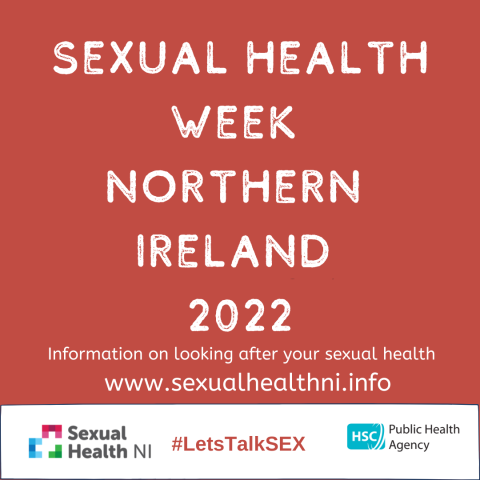#LetsTalkSEX – talking is the key to healthier sex

This Sexual Health Week (7-11 February) the Public Health Agency (PHA), along with the Sexual Health Improvement Network (SHIN), is urging everyone to talk openly about relationships and sex with their partners, friends and children to normalise how we view these issues.
The theme for this year’s Sexual Health Week is ‘Let’s Talk SEX’ because looking after your sexual health can have a positive impact on both your mental and physical wellbeing.
Barbara Porter, Health and Social Wellbeing Improvement Manager at the PHA, said: “Sexual relationships should always be consensual, and enjoying that relationship can be very rewarding and satisfying. It is important that everyone looks after their sexual health and understands issues surrounding sexual relationships, consent and respect, risks of sexually transmitted infections (STIs) and getting tested, pregnancy and contraception.
“Lasting relationships thrive on good communication. Get talking – let each other know what you want, don’t want and how you feel.”
You can look after your sexual health in a number of ways, for example:
- Having the knowledge and confidence to make good choices about if and when to have sex, and being able to talk about contraception and condoms.
- Being aware of how alcohol and drugs can affect your decision making. Too much alcohol or any drug use can mean you might take more risks. This includes having sex when you normally wouldn’t or, when you do, not using a condom.
- If you are sexually active, use condoms, limit your number of sexual partners and get tested quickly if you think you might be at risk of having contracted STIs.
- Being properly informed with accurate information and not being misled by internet or social media material.
“It is also important to take steps to reduce the risk of harm to yourself and others,” Barbara continued. “Condoms, used correctly are the only form of contraception that can protect against both unplanned pregnancy and STIs. If you are sexually active, using condoms is an important part of taking care of your sexual health.
“People with STIs don’t always have symptoms, but by having unprotected sex, you could effectively be sleeping with everyone your partner has ever slept with, putting yourself at risk of getting an STI. Therefore, we are urging people to always use a condom. If there is a chance you have contracted an STI, – simply order a free and discreet home STI test now at www.sh24.org.uk
“Men who have sex with men, who are having unprotected sex with casual or new partners, should have an HIV/STI screening at least annually, and every three months if changing partners regularly, due to their increased risk of infection. The advice is clear – choose to protect yourself and always wear a condom.
“It is also important to talk to your children about sex and relationships – to communicate with them what you would expect but also to listen to their thoughts and concerns. Children who feel comfortable talking to parents are more likely to open up about what they might be experiencing, having difficulty with, asking for help or support and being less secretive. This will help enable you to recognise any signs that they may need your support.”
There are several prevention and screening programmes available in Northern Ireland to help protect your sexual health. Information on these and more about looking after your sexual health, symptoms of STIs (as well as information on STIs which may be symptomless) and details of Northern Ireland GUM clinics can be found at www.sexualhealthni.info
- The Sexual Health Improvement Network (SHIN) is made up of representation from across a wide range of areas including the Department of Health, health and social care sector, education sector, Youth Justice System, and voluntary and community organisations working in the field of sexual health. The Network is led by the Public Health Agency (PHA) and chaired by the PHA Regional Sexual Health Lead on behalf of the Chief Medical Officer.
- The overall aim of the Network, by adopting a coordinated, partnership approach to sexual health improvement, is to improve, protect, promote and manage the sexual health and wellbeing of the population of Northern Ireland.
- The NSPCC provide advice for parents and carers on how to talk to their child about relationships, sex and consent – www.nspcc.org.uk/keeping-children-safe/sex-relationships/
